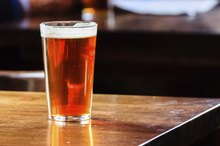Meal Plans for Recovering Bulimics
Bulimia is an eating disorder that causes sufferers to have a distorted sense of body image and a strong desire to be thin. Bulimic individuals have compulsions to eat large quantities of food and then often attempt to purge calories by under-eating or vomiting in order to reduce their weight. Treatment for bulimia includes very careful meal planning and regimented diet habits that allow the sufferer to avoid binging and purging.
Treatment for bulimia entails breaking the binging and purging cycle and encouraging healthy eating habits. Stress management and careful meal planning are key factors in a treatment plan. Patients slowly rework their eating habits and learn to plan healthful, well-balanced meals. Stress management techniques, such as yoga, deep breathing, and meditation can be used to avoid the binging and purging cycle. Meal plans become essential as a patient learns to practice consistent and mindful eating habits.
Balanced Diet
Recovery programs that focus on food addiction and eating disorders encourage patients to eat a well-rounded nutritious diet. Food Addicts Anonymous, FAA, a 12-step recovery program for people with food addictions and compulsive eating behaviors encourages individuals to follow regimented meal plans that include:
- a healthy balance of protein
- vegetables
- fruits,
- grains [3](http://www.foodaddictsanonymous.org/faa-food-plan 'inline-reference::Food Addicts Anonymous: FAA Meal Plan
- Food Addicts Anonymous,')
Timing meals at regular intervals and avoiding high sugar or high starch foods will help to eliminate cravings and regulate hunger.
Regulating Food Consumption
The Kaiser Liquid Diet
Learn More
Many meal plans for recovering bulimics encourage careful measurement and weighing of food. Patients learn to limit food quantities by following regimented portion control and weighing food items. The FAA diet plan, for example, provides a detailed list of protein, vegetable, fruit and gain options and exact measurements of what should be consumed.
Expert Insight and Support
Meal plans for recovering bulimics should be structured with the help of a physician or professional who specializes in eating disorders. Patients should develop a list of foods they feel comfortable eating that will be less likely to trigger compulsive eating or purging. A regimented schedule is also critical, and meals and snacks should be planned at regular intervals. The overall goal of these meal plans is to slowly develop healthier attitudes about eating nutritious and satisfying foods.
- Meal plans for recovering bulimics should be structured with the help of a physician or professional who specializes in eating disorders.
Related Articles
References
- Helpguide: Bulimia Nervosa: Signs, Symptoms,Treatment and Help, Melinda Smith and Sarah Kovatch, January, 2011
- BulimiaHelp: Creating a Meal Plan, Bulimia Help, 2008
- Food Addicts Anonymous: FAA Meal Plan, Food Addicts Anonymous,
- Wojciak RW. Effect of short-term food restriction on iron metabolism, relative well-being and depression symptoms in healthy women. Eat Weight Disord. 2014;19(3):321-7. doi:10.1007/s40519-013-0091-2
- Zendegui EA, West JA, Zandberg LJ. Binge eating frequency and regular eating adherence: the role of eating pattern in cognitive behavioral guided self-help. Eat Behav. 2014;15(2):241-3. doi:10.1016/j.eatbeh.2014.03.002
Writer Bio
Christy Bowles has 15 years of experience in the field of education, with 10 years working in mental health and wellness. She specializes in the treatment of depression, anxiety and substance abuse, with a focus on alternative treatment modalities. Bowles holds a Master of Education from Harvard University.









